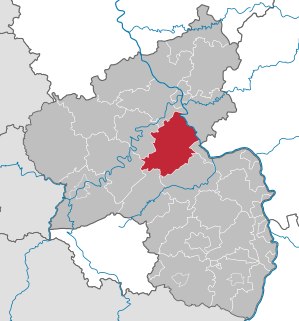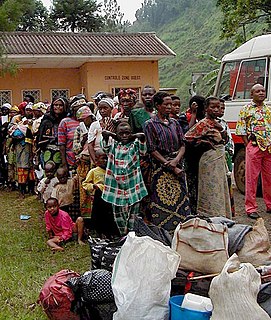
Kigali is the capital and largest city of Rwanda. It is near the nation's geographic centre. The city has been Rwanda's economic, cultural, and transport hub since it became capital at independence in 1962. The city hosts the main residence and offices of the President of Rwanda and government ministries. The city is within the province of Kigali City, which was enlarged in January 2006, as part of local government reorganisation in the country. Kigali's city limits cover the whole province; it is consolidated. The city's urban area covers about 70% of the municipal boundaries.
Human occupation of Rwanda is thought to have begun shortly after the last ice age. By the 16th century, the inhabitants had organized into a number of kingdoms. In the 19th century, Mwami (king) Rwabugiri of the Kingdom of Rwanda conducted a decades-long process of military conquest and administrative consolidation that resulted in the kingdom coming to control most of what is now Rwanda. The colonial powers, Germany and Belgium, allied with the Rwandan court.
The Hutu, also known as the Abahutu, are a Bantu ethnic or social group native to the African Great Lakes region of Africa, primarily area now under Burundi and Rwanda. They mainly live in Rwanda, Burundi, and the eastern Democratic Republic of the Congo, where they form one of the principal population divisions alongside the Tutsi and the Twa.

The Tutsi, or Abatutsi, are a social class or ethnic group of the African Great Lakes region. Historically, they were often referred to as the Watutsi, Watusi, Wahuma, Wahima or the Wahinda. The Tutsi form a subgroup of the Banyarwanda and the Barundi peoples, who reside primarily in Rwanda and Burundi, but with significant populations also found in Uganda, the Democratic Republic of the Congo and Tanzania. They speak Rwanda-Rundi, a group of Bantu languages.

Rhein-Hunsrück-Kreis is a district in the middle of Rhineland-Palatinate, Germany. The neighbouring districts are Mayen-Koblenz, Rhein-Lahn, Mainz-Bingen, Bad Kreuznach, Birkenfeld, Bernkastel-Wittlich, Cochem-Zell.

Paul Kagame is a Rwandan politician and former military leader. He is currently the President of Rwanda, having taken office in 2000 when his predecessor, Pasteur Bizimungu, resigned. Kagame previously commanded the rebel force that ended the 1994 Rwandan genocide. He was considered Rwanda's de facto leader when he served as Vice President and Minister of Defence from 1994 to 2000. He was re-elected in August 2017 with an official result of nearly 99% in an election criticized for numerous irregularities. He has been described as the "most impressive" and "among the most repressive" African leaders.

The Rwandan genocide, also known as the genocide against the Tutsi, was a mass slaughter of Tutsi in Rwanda during the Rwandan Civil War, which had started in 1990. It was directed by members of the Hutu majority government during the 100-day period from 7 April to mid-July 1994. An estimated 500,000 to 1,000,000 Rwandans were killed, constituting an estimated 70% of the Tutsi population. Additionally, 30% of the Pygmy Batwa were killed. The genocide and widespread slaughter of Rwandans ended after the Tutsi-backed and heavily armed Rwandan Patriotic Front (RPF), led by Paul Kagame, took control of the capital and the country. An estimated 2,000,000 Rwandans, mostly Hutu, were displaced and became refugees.

The Second Congo War began in the Democratic Republic of the Congo in August 1998, little more than a year after the First Congo War, and involved some of the same issues. The war officially ended in July 2003, when the Transitional Government of the Democratic Republic of the Congo took power. Although a peace agreement was signed in 2002, violence has continued in many regions of the country, especially in the east. Hostilities have continued since the ongoing Lord's Resistance Army insurgency, and the Kivu and Ituri conflicts.

Grégoire Kayibanda was the first elected President of Rwanda. As pioneer of the Rwandese revolution, he led Rwanda's struggle for independence from Belgium, and replaced the Tutsi monarchy with a republican form of government. He asserted Hutu majority power.

Hotel Rwanda is a 2004 British–Italian–South African historical drama film directed by Terry George. It was adapted from a screenplay co-written by George and Keir Pearson, and stars Don Cheadle and Sophie Okonedo as hotelier Paul Rusesabagina and his wife Tatiana. Based on the Rwandan genocide, which occurred during the spring of 1994, the film documents Rusesabagina's acts to save the lives of his family and more than a thousand other refugees by providing them with shelter in the besieged Hôtel des Mille Collines. Hotel Rwanda explores genocide, political corruption, and the repercussions of violence.

The Rwanda national football team represents Rwanda in international football. It is controlled by the Rwandese Association Football Federation, the governing body of football in Rwanda, and competes as a member of the Confederation of African Football (CAF), as well as the Council for East and Central Africa Football Associations (CECAFA), a CAF sub-confederation that governs football in East and Central Africa. The team bears the nickname Amavubi, and primarily plays its home games at the Stade Amahoro in Kigali, the nation's capital. They have never qualified for a World Cup finals, and reached their first Africa Cup of Nations in 2004.

Elections in Rwanda take place within the framework of a multi-party democracy and a presidential system. The President and majority of members of the Chamber of Deputies are directly elected, whilst the Senate is indirectly elected and partly appointed.
The Rwanda Defence Force is the national army of Rwanda. The country's armed forces were originally known as the Rwandan Armed Forces (FAR), but following the victory of the Rwandan Patriotic Front in the country's civil war in 1994, it was renamed to the Rwandan Patriotic Army (RPA), and later to its current name.

The Rwandan franc is the currency of Rwanda. It is subdivided into 100 centimes.
The Rwanda Premier League is the highest division of football in Rwanda. The league was formed in 1975. It was known as the Primus National Football League in 2004 and from 2009–10 to 2012–13, after which sponsorship was taken over by Turbo King. The league was renamed the Azam Rwanda Premier League for the 2015–16 season after Tanzanian television broadcasters Azam TV were announced as sponsors in a deal worth US$ 2.35 million.

Kiyovu Sports Association, more commonly known as S.C. Kiyovu Sports, Kiyovu Sports or Kiyovu, is an association football club based in Kigali, Rwanda. The team currently competes in the Rwanda National Football League, and plays its home games at Mumena Stadium or Amahoro Stadium. The club's reserve team currently competes in the Rwandan Third Division. The club has won five league titles, three trophies, and one super cup, and was the only Rwandan club to go a whole season unbeaten in 1990.

Mützig is a beer brand owned by Heineken and its subsidiaries, and was originally brewed in 1810 by Brasserie Mutzig of Alsace, France. It is now a 5.5% ABV lager available in 65cl and 33cl bottles. It has a full-bodied taste and distinctive packaging, and is the most successful premium, locally brewed beer in Central Africa. Mützig is considered a flagship African brand.















